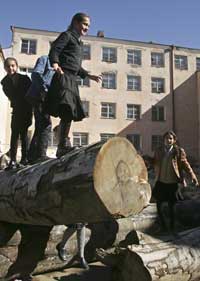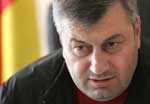
|
Georgia-Russia row spills into separatist regions
TSKHINVALI, Georgia (AP) - Passing through the armed, garbage-strewn checkpoint, travellers get a warning from a Georgian guard: Once you cross, you're on your own. The barrier is a stark image of Georgia's failure to assert its authority over its breakaway region of South Ossetia, which has just voted to ratify the breakup, raising the stakes in a struggle for control of the multiethnic, multireligious Caucasus that some fear could come to echo the Balkan wars.
South Ossetia isn't alone in seeking to break with the mother country. Abkhazia is on that path too. Georgian President Mikhail Saakashvili came to power two years ago vowing to make his fractured ex-Soviet republic whole again, and he has U.S. President George W. Bush's support. But he is bitterly at odds with neighboring Russia, which is seen as the muscle behind both breakaway areas. Negotiations are stalled. Experts say South Ossetia and Abkhazia are strewn with weapons — in the hands of villagers, armed peacekeepers and in Soviet-era storehouses. Both have already fought a war with Georgia, and fears of another run high. Saakashvili has aroused the Kremlin's displeasure by looking to the West, seeking NATO membership and arresting Russian officers as spies. He sent troops to Iraq, invited in U.S. military advisers to train Georgian soldiers, and got a warm visit by Bush last year. So South Ossetia and Abkhazia represent a handy Russian tool against Saakashvili. Although not contiguous, the two regions have a mutual defense pact, most of their 320,000 residents hold Russian citizenship, and both territories depend heavily on Russian financial support. South Ossetia broke away from Georgia's central government in a war in the early 1990s, and its leader wants to unite it with the Russian province of North Ossetia, making it part of Russia. Meanwhile, a region that used to have a high rate of Ossetian-Georgian intermarriages is now a checkerboard of ethnically separated Georgian and Ossetian villages. As for Abkhazia, it also fought a war with Georgia in 1992, fearing it was about to lose its autonomy. The conflict drew in other Caucasus Mountain peoples from Russia, including Chechen fighter Shamil Basayev, who helped the Abkhazians force the Georgian withdrawal in 1993. Tens of thousands were killed, and more than 250,000 ethnic Georgians fled. South Ossetia's referendum a week ago, which produced a 99 percent vote for independence, isn't recognized internationally and is unlikely to bring any immediate changes. But Russia called it a "landmark" event and analysts say Moscow could use the results to further pressure Georgia. Abkhazia, meanwhile, has appealed to the Russian parliament to recognize its independence. Adding to the tension are the talks under way in New York about whether to grant independence to the U.N.-run province of Kosovo. The Serbian province is more than 1,000 miles (1,600 kilometres) from here and its troubles are unrelated to the Caucasus, but Saakashvili fears a dangerous precedent would be set. Independence for Kosovo, or for Georgia's own rebellious provinces, "would be opening a Pandora's box," he said in an interview with The Associated Press. "Any kind of courting of this idea that one can dismember a small, multiethnic country like Georgia ... is just irresponsible. Anybody who would even play with this idea would be playing with fire."
On Oct. 20 Russian President Vladimir Putin warned
European Union leaders that Georgia was preparing military action.
Saakashvili, however, says he rules out any fresh effort to retake
the regions by force, and this month he sacked his hawkish defence
minister who had declared that he would be celebrating this New
Year's Eve in Tskhinvali, the capital of separatist South Ossetia. But Georgia is coupling the carrot with a big stick, training and building up its armed forces with American help and buying tanks and other weaponry from pro-Western nations such as Ukraine. The toll of the last decade's fighting remains visible in the tens of thousands of refugees stuck in Tbilisi, the Georgian capital. Saakashvili has sought to demonstrate his resolve by closing a huge contraband bazaar that was a symbol of the lawlessness that had run unchecked throughout Georgia since the Soviet collapse. He also reasserted his authority over two lesser regions that had become separate fiefdoms. One of them is Batumi, a Black Sea port into which Saakashvili has poured money, hoping his generosity will be noticed in South Ossetia and Abkhazia and lure them back into the fold. For now, though, South Ossetia isn't buying it. "Our standard of living is higher," the region's de facto leader, Eduard Kokoity, told AP, sitting at his desk decorated with a Russian and South Ossetian flag. "Don't focus on the several buildings that are destroyed and that we haven't repaved the streets like in Tbilisi. We have been under blockade for 16 years, facing aggression and military activity." Ossetians who agreed to talk to a reporter said they support Kokoity and see their future in a union with Russia, rather than with Georgia, claiming it burned their homes and schools during the 1990s fighting. "The Georgians say this is their land, but it has always been our land," said a resident. |
| || Front
Page | News
| Editorial
| Columns
| Sports
| Plus
| Financial
Times | International
| Mirror
| TV
Times | Funday
Times | ST-1
|| |
| |
Copyright
2006 Wijeya
Newspapers Ltd.Colombo. Sri Lanka. |

